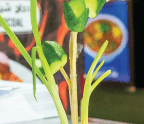A Tortoise Stakeout with Patricia Lockwood
I have a mildly confessional face, which means that strangers often feel compelled to tell me things. My natural mode of small talk is inquisitive, like the good cop in an interrogation, and I attract oddballs (although not as many as I used to). These factors together mean the occasional reception of terrible secrets. Once, a man I asked for directions confessed to an unprosecuted murder (in fact, a double murder); in a bar, a woman blurted out a cancer diagnosis nobody else knew about. A confessional face can be useful for a writer, although its consequences are sometimes unwelcome.
I mention this only because it means I can recognize a related quality, a much rarer one, which is the ability not just to encounter this strangeness and revelation, but to manifest it. It’s the difference between being a weirdo magnet and being Weirdo Magneto. So it is not blurb-speak to call Patricia Lockwood a writer of “rare power”: she has a confessional face, and also a self-confessional face, and emanates a humorous and apparently limitless energy that blends and blurs the reality around her. She attracts eccentrics the way hunting deities are depicted attracting beasts, and her chosen habitat of Savannah, Georgia, is teeming with them.
She moved to Savannah almost on sight, because it is so beautiful and so strange, and a reader encountering her work for the first time could trip over this influence, mistaking her poetry as Southern gothic played for laughs, everything made supernaturally lush and fervent by marsh air. But she was born in the Midwest—living in “all the worst cities of the Midwest,” places such as Cincinnati, Ohio, and Fort Wayne, Indiana—and they honed her style like whetstones. She is also part of that first generation of writers to be shaped by the internet, from a time when it was still called the “information superhighway.” I suppose it’s odd, to think about Weird Twitter and Something Awful being influential the way that Encounter or The Criterion once were. But without that lineage—first coders, then jokers, then journalists who picked up what she calls the “crisp new style,” recognizable immediately—the elements in her work that might be termed “insanely online” will be missed.
On the way to Savannah, driving from the mystery of Saint Helena Island in South Carolina, I listened to Lockwood read the audio version of her most recent book. It is an autobiographical work (although it is really not so readily classifiable as this) called . As the semiofficial poet laureate of Twitter, she is best known for both poetry and brevity, so it was interesting sustains it. The imagery is so crowded, so populated with what Lockwood calls her “private zoo of description,” that together, it becomes a hyperanalogy for her life, and everyone else’s.
You’re reading a preview, subscribe to read more.
Start your free 30 days


